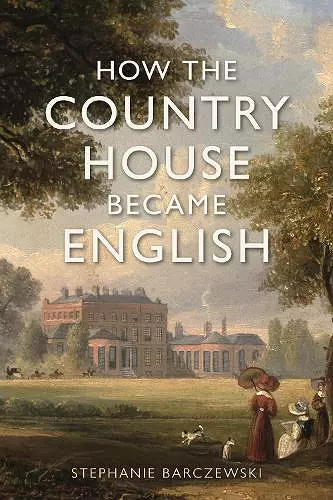How the Country House Became English
Format:Hardback
Publisher:Reaktion Books
Published:1st Jul '23
Should be back in stock very soon

Country houses have come to be regarded as quintessentially English, not only in terms of their architectural style but because they appear to embody national values of continuity and insularity. The histories of country houses and England, however, have featured episodes of violence and disruption, so how did country houses come to represent one version of English history, when in reality they reflect its full range of contradictions and complexities? This book explores the evolution of the country house, beginning with the violent impact of the Reformation and Civil War and showing how the political events of the eighteenth century, which culminated in the reaction against the French Revolution, led to country houses being recast as symbols of England’s political stability.
English architectural style has long been a confusion, to which Stephanie Barczewski offers a well-informed guide . . . Her conclusion is that ‘English country houses, like the country in which they reside, have been many different things at different times’. It may be a downbeat ending, but she makes getting there an enjoyable journey. -- Simon Jenkins * Times Literary Supplement *
[Country Houses] are, Stephanie Barczewski argues, symbols of national identity, expressing the supposed continuity of British—more specifically English—history . . . Prof Barczewski writes well about the role previously played by monasteries in the landscape . . . [and] rightly draws attention to the complexities and contradictions of the country house. -- Clive Aslet * Country Life *
Building on her last book, Country Houses and the British Empire 1700–1930, which made an important contribution to the debate on the global country house and the legacy of colonialism, Stephanie Barczewski sets out to explore how country houses came to be seen as embodiments of Englishness . . . It isn’t only its apparent Englishness that is full of contradictions, which this thought-provoking book untangles. It is the country house itself, which is simultaneously defiant and ashamed, relevant and irrelevant. It is those ambiguities that will ensure its survival into the next century. -- Adrian Tinniswood * Literary Review *
An essential for fans of English country houses. I have visited well over 100 English country houses in my life, many on multiple occasions. I’ll never look at them the same way again having read this book. It’s brought into focus many of the questions I ask of a property, which until now haven’t considered the broader context of local and national history . . . This book is not light reading, but it is rewarding and worth the effort . . . This isn’t a book about architecture. It’s about English country houses, their origins, histories and occupants. To illustrate the discussion, it contains a rich collection of stories about the history of specific English country houses, which are as much about people, politics and religion as they are about design and construction. If, like me, you’d like to deepen your understanding of the great many English country houses you’ve visited, or would like to visit, this book is essential reading. -- Andrew Knowles * Regency History *
This exploration of the evolution of the quintessentially English country house shows how the political events of the 18th century led to country houses being recast as symbols of England’s political stability. -- Caroline Sanderson * The Bookseller *
An immensely readable and shrewd analysis of the myriad ways the English country house (even when it was not in England) mirrored the most potent politics of the day, all the way from the dissolution of the monasteries in the sixteenth century to the twentieth century. Barczewski’s sure-footed grasp of a lengthy span of British history alongside her knowledge of architectural history makes this a compelling and a fascinating read. * Philippa Levine, Professor and Walter Prescott Webb Chair in History and Ideas, University of Texas at Austin *
In her previous book, Stephanie Barczewski explored the powerful influence that the British Empire exerted on the economic resources and material culture of British country houses. Now, in an equally original, pioneering and audacious work, she turns to explore another, no less important question: how was it that country houses became regarded as the embodiment of historical continuity (despite much disruption and violence along the way), and also as the quintessence of Englishness (despite close connections with the rest of the British Isles, Continental Europe and the British Empire)? The result is an enthralling account, written with grace and elegance, by a brilliant historian at the very top of her game. * Sir David Cannadine, Dodge Professor of History Emeritus, Princeton University, and editor of the Oxford Dictionary of National Biography *
A wide-ranging account of the English country house and its evolving significance across four centuries, Barczewski’s book is essential reading for anyone wishing to understand English national identity, in all its complexity and contradictions. * Paul Readman, author of Storied Ground: Landscape and the Shaping of English National Identity *
ISBN: 9781789147605
Dimensions: unknown
Weight: unknown
392 pages